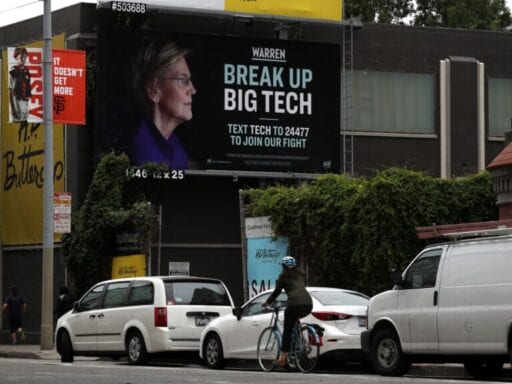The devil with Elizabeth Warren’s fundraising pledge is in the details.
Elizabeth Warren’s team in recent weeks explored ways to raise money from Silicon Valley donors without violating her ironclad fundraising pledge to not “sell access to my time,” Recode has learned.
The Democratic presidential candidate considered an inbound request to have a representative from her campaign — such as an endorser, a staff member, or a high-level volunteer leader — attend a high-dollar event in the Bay Area, according to several people familiar with the discussions. Those talks coincided with a previously unreported event in San Francisco that raised about $12,000 for her campaign, hosted by local physicians and activists.
The back-and-forth between Warren’s campaign and her supporters reveals how Warren’s promise to not sponsor high-dollar fundraisers is proving to need more definition, just like her pledge not to take money from executives at Big Tech companies. The candidate last week also backtracked on her refusal to disavow any pro-Warren super PACs when she declined to call on a new group to take down ads airing on her behalf. This all reaffirms two things: that Warren isn’t willing to fundraise the traditional way, but also that she’s not completely closed off to considering funding from Big Tech sources.
Warren needs money to campaign in some of the country’s most expensive states on Super Tuesday, especially after disappointing results in the first three primaries that have given Bernie Sanders serious momentum. At the time of these talks, Warren was very close to going broke.
Warren’s wealthy backers in the Bay Area have long pushed for the candidate to relax some of her rules on fundraising to accommodate their interest in supporting her campaign. But over the last month or so, these supporters renewed their approach, engaging the campaign to see whether it would be willing to send out Warren endorser Julián Castro, for instance, to headline a fundraiser on her behalf. The campaign shut down that idea relatively quickly.
But other ideas, such as having a volunteer leader appear, the sources say, were debated more openly by the Warren camp. Talks between Warren’s campaign and organizers were serious enough that some donors expected the fundraiser to happen if both sides could align their schedules. Official invitations never went out, but organizers had told some pro-Warren tech donors about the event.
Ultimately, though, the scheduling issues and the hoops that organizers would have to jump through in order to meet the Warren campaign’s exacting standards sapped enthusiasm for a high-dollar event, and so organizers eventually pulled the plug. Without getting an enthusiastic yes from campaign headquarters, the idea is now widely considered dead, sources say.
The Warren campaign declined to comment for this story.
Despite her tough talk about Silicon Valley, Warren certainly has wealthy fans in certain corners of the tech industry who want to back her bid for president. But Warren has pilloried high-dollar fundraising events as part of a corrupt campaign finance system, and she and rival Sanders have declined to host these closed-door receptions. That’s offered her a cudgel against candidates closer to tech donors and all contributors, such as Pete Buttigieg, who she says is in the pocket of billionaires.
The high-dollar event would’ve come a few weeks after the Warren campaign was accommodating of a lower-dollar “gathering” held in San Francisco in late January. About 50 women who support Warren gathered for a fundraiser led by physicians and organized by Jennifer Brokaw, the daughter of the legendary news anchor, according to a copy of the invitation.
The event raised $12,000 — but it wasn’t easy. Organizers originally had a $100-per-head entry price but suspended that and turned it into a “suggested” donation to comply with campaign rules, Brokaw said. Supporters could email the campaign if “donating poses a hardship.” They had to make sure that they didn’t spend too much money on food and drinks (the event’s signature cocktail: “Billionaire Tears”). And they had to hold it in a community space that was open to the public — not, for instance, in someone’s private home.
“It was pretty eye-opening to see that we had really to play by the Elizabeth Warren rules to do anything. And we did it in a very grassroots way,” Brokaw told Recode.
Almost everyone at the San Francisco event — which was heavy not on tech titans but on doctors and activists — gave at least $100, Brokaw said, beating the event’s goal of a $10,000 haul.
Warren’s campaign offered some support. Surrogate and activist Tracey Corder, who has traveled and opened offices on behalf of the Warren campaign, spoke at the event, and Warren offered materials like campaign signs and sign-in sheets, Brokaw said. Corder said at the end of her onstage remarks that if what attendees heard made them want to back Warren, they could contribute to the campaign using iPads positioned in a nearby room or volunteer.
All told, the two events show just how open to interpretation campaign fundraising rules can be in 2020, especially for Warren, given her stringent guidelines on donations. Brokaw said she expects this all to be pretty “tricky going forward.”
“It’s really clear that money is ruling the day right now. And I’m waiting to see how they handle all of this, too,” Brokaw said. “Because her ability to finish out this process and get the nomination is probably going to take more money than the strategy that she’s pursuing so far. But I don’t know how she’s going to stick with it.”
Author: Theodore Schleifer
Read More



